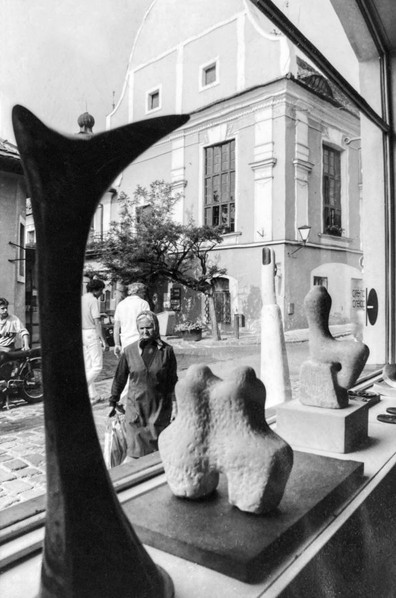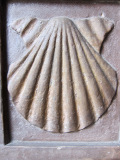
Photo: Péter Deim
Working Group on Cultural Heritage and Property
The SIEF Working Group on Cultural Heritage and Property (CHP) was established at the 2008 Derry congress, to address multiple dimensions of cultural heritage, its symbolic and economic power, as well as contingent political implications. Its interests and activities encompass issues of heritage policy, theory, and practice.
Any SIEF member is welcome to join our working group. To join, visit the CHP WG page of the SIEF website and register online for the CHP WG listserv. If you would like to learn more, or become involved in WG activities, send an email to Carley Williams carley.williams1(at)abdn.ac.uk or Robert Baron rbtbaron(at)gmail.com.
We welcomed many ongoing and new members of CHP at the Aberdeen Congress, in person and online. The WG activities featured panel presentations and a roundtable discussion, Writing Living Heritage? Uses and Misuses of Transforming Cultural Practices into Cultural Texts. Provocative papers and a robust discussion explored how we, as scholars, practitioners and policy advisors can foster more critical involvement in living heritage writing in policymaking, heritage research, and within UNESCO frameworks.
Our business meeting included a poignant remembrance by Anita Vaivade of our esteemed and beloved CHP founder Kristin Kuutma, who passed away shortly before the Congress. Kristin was an invaluable driving force in establishing and sustaining our working group as a vibrant forum to comprehensively engage with heritage through critical analysis, policy and practical domains.
For 2025-27 Robert Baron and Carley Williams will continue as Co-Chairs, with Carley also continuing in her ongoing role as Secretary. Timothy Thurston of the University of Leeds has joined the Board as our newest member, and Katriina Siivonen continues on the Board. The Working Group and Board are grateful for the service of Ioana Baskerville, Helmut Groschwitz and Alessandro Testa, who have retired from the Board. And our warmest congratulations to Ioana, who has been elected to the SIEF Executive Board. Our thanks to Helmut, who has graciously agreed to establish a new Facebook page for the WG, after a fruitless search for the owner of the previous page. And planning is underway with Historical Approaches in Cultural Analysis (HACA) WG for a joint interim meeting in May 2026.
Our members have been busy as ever with research projects, publications and conferences. Please let Carley and Robert know about your activities for our future newsletters, and any announcements you would like shared with our listserv. Here, for now, are a few that have been submitted by CHPers for this edition:
In a new edited volume in Swedish, Kulturav som politik och pedagogik (Cultural Heritage as Politics and Pedagogy), researchers and heritage workers explore the joints between heritage/museum education and politics. Charlotte Engman’s chapter investigates the experiences of threats and hatred related to difficult heritage in museums and the psychosocial work environment of educators.
Kristóf Nagy is sharing the call for papers for an edited volume, Infrastructures of Selling Modern and Contemporary Art in Socialism and Postsocialism which will critically examine the infrastructures of art markets in Central and Eastern Europe during and after the socialist era. Proposals are to be sent as an abstract of no more than 500 words and a short biography of 150 words by November 30th here.

View from the Artery Gallery over the Town Hall of Szentendre, 1986. Photo: Péter Deim.
Timothy Thurston organized a conference in June on cultural sustainability at the University of Leeds as part of the Tibetan Sustainable Heritage Initiative. The event, which included participants from Asia, Africa, Europe and North America, fostered conversations about cultural heritage, cultural property, and cultural sustainability around the world. Tim recently returned from leading a cultural documentation field school, in collaboration with Nankai University and Qinghai Minzu University, focused on documenting the inspired bards of the Tibetan Gesar epic and co-creating methods for its continued living transmission in the twenty-first century. He indicated that it is, to his knowledge, the first program of its kind to be run in and with Tibetan communities in China.
The Royal Anthropological Institute and The Folklore Society jointly host an annual conference series, Folklore and Anthropology in Conversation, which encourages empirical and conceptual dialogue between the two related disciplines of folklore and anthropology. Rawan AlFuraih provides us with information about this year’s conference, Revisiting Oral Narrative: Anthropology, Folklore and History, in person and online, which will explore facets of the debate about oral narrative and its relation to history and the transmission of knowledge. Multiple points of view from various areas of the world will be examined, including oral narratives and the distant past, the changing parameters of orality in the digital age, and the continuing relevance or not of earlier theoretical approaches. Details about the conference and a link for registration can be found here.
Hanna Schreiber, the UNESCO Chair on Intangible Cultural Heritage in Public and Global Governance at the University of Warsaw delivered training on intangible heritage and crisis management for civil and military representatives from 18 EU Member States. The training, organised by the Italian Civil Protection Department, integrated ICH safeguarding into risk prevention and emergency response frameworks and is part of the PROCULTHER-NET programme on cultural heritage protection in emergencies. The Chair hosted a seminar on the role of the Polish Armed Forces in safeguarding intangible heritage, exploring intersections between humanitarian law, defence activities, and the 2003 UNESCO Convention. The discussion contributed to emerging global dialogue on integrating ICH protection into security and peacebuilding policies. Together with Prof. Bartosz Pieliński, the UNESCO Chair on ICH in Public and Global Governance, co-organised with UNESCO a webinar on artificial intelligence and ICH. The event discussed how AI technologies are transforming the safeguarding of ICH, raising ethical and governance challenges for the heritage field.
CHP members continue to be deeply involved in UNESCO ICH activities as experts on states party delegations, members of the Evaluation Body and as active participants in the ICH NGO Forum and its Working Groups. SIEF is an accredited UNESCO ICH NGO, and any SIEF member can join a Working Group by emailing a chair through the working group page on the ICH NGO Forum website. The 2025 annual meeting of the Intergovernmental Committee, 20COM, will take place in New Delhi, India, 7-13 December 2025. SIEF members may attend in person, or follow the proceedings on the UNESCO ICH web site for the annual meeting, which will also include a link for registration and detailed information by late October.
Each year the ICH NGO Forum organizes a symposium on the day preceding the beginning of the Intergovernmental Committee meeting. This year’s symposium, Leaving No-One Behind: Intangible Cultural Heritage and Inclusion with Emphasis on Persons with Disabilities and Special needs, will be held on December 6th. Look for details on the symposium and the entire ICH NGO Forum program during the week of the Intergovernmental Committee meeting on the ICH NGO Forum website.
Activities of the ICH NGO Forum appear in its newsletter, on the Facebook group: ‘Intangible Cultural Heritage and Civil Society’ and the LinkedIn group: ‘ICH NGO Forum’.




